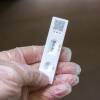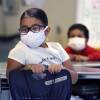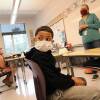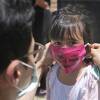As health experts had feared, COVID-19 numbers are spiking again as Massachusetts comes out of the holiday season.
In the Boston area , wastewater COVID-19 levels increased nearly 80% in just the last two weeks. Statewide, COVID-19 hospitalizations are also up, with the seven-day average increasing 43% in the last two weeks.
The new surge mirrors what was seen at this time last year as the omicron variant spread rapidly. It's not yet clear if numbers will continue to spike through the winter as severely as they did in early 2022.
"I think that in the next couple of weeks, we will continue to see an increase in our number of cases, as well as the number of hospitalizations that we see across the city," said Dr. Bisola Ojikutu, Boston's commissioner of public health and executive director of the Boston Public Health Commission. "And that's being driven, I believe, both by social interactions over the holidays, and people are not doing as much masking indoors. And then we have a highly transmissible subvariant that circulating."
The new XBB subvariant has become the dominant strain of COVID-19 in the Northeast.
"It's about 75% of the cases in the New England region," Ojikutu said. "And in terms of its characteristics, I think that we're still teasing that out."
More Local News
While the new strain doesn't appear to cause more severe disease, evidence suggests the XBB variant is more able to evade immunity, whether from vaccination or previous infection, Ojikutu said.
"There are a lot of unknowns with the new variant," said Julia Raifman, an assistant professor at the Boston University School of Public Health, who leads the COVID-19 U.S. State Policy Database . "We aren't sure how many people will develop long COVID because of the new variant. We aren't sure how many people will end up dying because of the new variant. But we do know that when there are increased cases, as there are now, there are increased hospitalizations and there are increased deaths."
Patient capacity levels at Massachusetts hospitals are still rated at "tier 2" by the state Department of Public Health, meaning that they're considered at moderate risk of needing to adjust practices — such as adding surge capacity beds or limiting elective procedures — due to strained resources. But some doctors say the impact of the surge is beginning to be felt.
"In a setting where the [emergency department] has already been crowded and people have been forced to wait for hours to be admitted, we are seeing longer waits and more crowded EDs," said Dr. Cassandra Pierre, associate hospital epidemiologist and medical director of public health programs at Boston Medical Center. "We have been having delays in beds opening up because we're waiting for people to screen negative before they're transferred out to an acute care setting. ... We do see an increase in admissions and hospitalizations with people with COVID, and we only really need a small increase of people being admitted to put us over the edge."
Pierre said she hopes never again to see situations like earlier in the pandemic in which non-clinical areas needed to be opened to accommodate an influx of patients.
"We certainly don't sense that we're in a crisis at this moment, but we're watching it really carefully," Pierre said.
"What I hope is that people will realize that COVID-19 remains a threat," said Dr. Ojikutu. "It's a concern for our health care system, for our communities, for our families, and to take our recommendations seriously."
Those recommendations include wearing a mask indoors and on public transportation.
"I realize that people are tired of masking, but it is a strategy that works," she said.
Health officials are also pressing for more people to receive COVID-19 vaccines and boosters. The state is now even offering $75 gift cards for anyone who gets a shot.
Racial and ethnic disparities have persisted in vaccinations, with 47% of Hispanic people and 52% of Black people in the state having received a booster shot as of Jan. 2, compared to 66% of white people.
As students return to school this week, there's broad concern over a possible surge of cases spreading in classrooms. In Boston, some parents had pressed for the reinstatement of mask mandates in the weeks following the holidays. But the issue has been controversial, with other parents expressing concerns that masks interfere with students' education and socialization.
Last week, Boston Public Schools chose not to issue a mandate , instead simply recommending that students wear masks.
"We certainly want to encourage kids, students and staff to wear masks. And we hope that they will comply," said Dr. Ojikutu. "And we hope that there is a sense of collective responsibility and that this will decrease the risk of of transmission within the school setting."
A study published in November and authored in part by the Boston Public Health Commission highlighted the power of mask mandates to prevent COVID-19 infections. It said Massachusetts school districts that lifted mask mandates immediately after the state relaxed its requirement in February saw far more COVID-19 cases than districts that retained the policy voluntarily.
"If we have a recommendation and half or even 30% of people are not wearing a mask and those people have COVID, then just one person can still fill the air around everyone else with COVID if they unknowingly are sick," said Julia Raifman of the Boston University School of Public Health. "And so mask policies that achieve universal masking together are really most effective."









